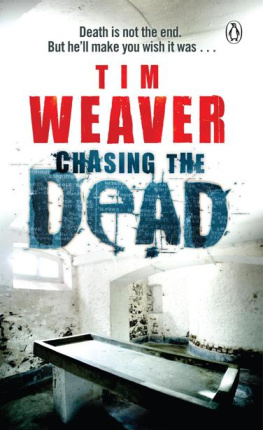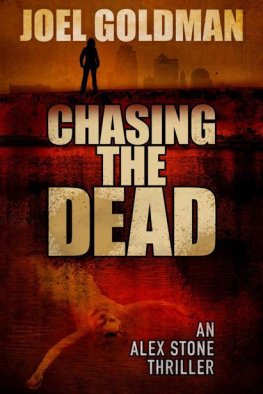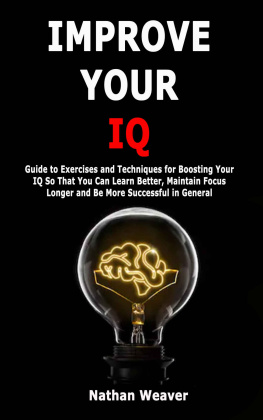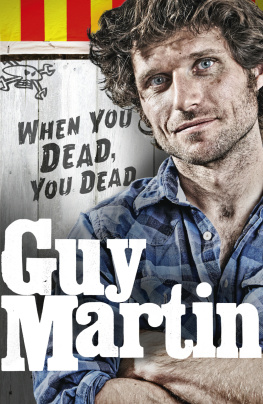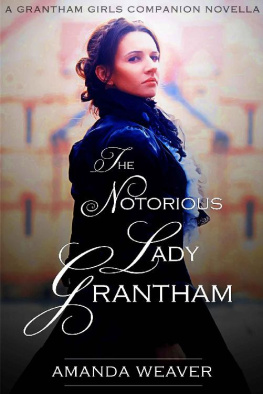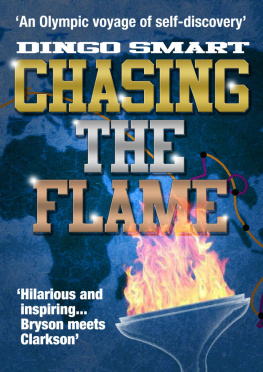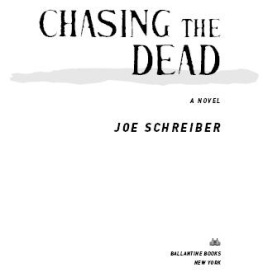Tim Weaver - Chasing the Dead
Here you can read online Tim Weaver - Chasing the Dead full text of the book (entire story) in english for free. Download pdf and epub, get meaning, cover and reviews about this ebook. year: 2010, publisher: Penguin Books Ltd, genre: Detective and thriller. Description of the work, (preface) as well as reviews are available. Best literature library LitArk.com created for fans of good reading and offers a wide selection of genres:
Romance novel
Science fiction
Adventure
Detective
Science
History
Home and family
Prose
Art
Politics
Computer
Non-fiction
Religion
Business
Children
Humor
Choose a favorite category and find really read worthwhile books. Enjoy immersion in the world of imagination, feel the emotions of the characters or learn something new for yourself, make an fascinating discovery.
- Book:Chasing the Dead
- Author:
- Publisher:Penguin Books Ltd
- Genre:
- Year:2010
- Rating:5 / 5
- Favourites:Add to favourites
- Your mark:
- 100
- 1
- 2
- 3
- 4
- 5
Chasing the Dead: summary, description and annotation
We offer to read an annotation, description, summary or preface (depends on what the author of the book "Chasing the Dead" wrote himself). If you haven't found the necessary information about the book — write in the comments, we will try to find it.
Chasing the Dead — read online for free the complete book (whole text) full work
Below is the text of the book, divided by pages. System saving the place of the last page read, allows you to conveniently read the book "Chasing the Dead" online for free, without having to search again every time where you left off. Put a bookmark, and you can go to the page where you finished reading at any time.
Font size:
Interval:
Bookmark:
PENGUIN BOOKS
Chasing the Dead
Tim Weaver was born in 1977. He left school at eighteen and started working in magazine journalism, and has since gone on to develop a successful career writing about films, TV, sport, games and technology. He is married with a young daughter, and lives near Bath. Chasing the Dead is his first novel.
There are a great many people who have helped with the writing of this book.
My agent Camilla Bolton has been a constant source of guidance and encouragement, and is always armed to the teeth with incredible ideas and suggestions. Plus, she pretends to laugh at my jokes, and never fails to answer an email (even the really boring ones, of which there are many). Maddie Buston and everyone else at Darley Anderson also deserve a special mention for all their hard work and support, and for getting behind me from day one.
A big thank you to my editor Stefanie Bierwerth, who took a chance on a book by a first-time author and whose eye for a story helped to massively improve the novel when it arrived on her desk. She was also kind enough to give me a say in other areas of publication when she really didnt have to. I also want to say a huge thanks to the fantastic team at Penguin, who have worked so tirelessly on my behalf.
The Just Switch It On And Let Him Talk award goes to Bruce Bennett, whose fascinating tales of police life provided more hours of Dictaphone tape than I could ever hope to use (or want to transcribe). Any errors are entirely of my own making.
Find out more about the next David Raker thriller at www.timweaverbooks.com
Sometimes, towards the end, she would wake me by tugging at the cusp of my shirt, her eyes moving like marbles in a jar, her voice begging me to pull her to the surface. I always liked that feeling, despite her suffering, because it meant shed lasted another day.
Her skin was like canvas in those last months, stretched tight against her bones. Shed lost all her hair as well, except for some bristles around the tops of her ears. But I never cared about that; about any of it. If Id been given a choice between having Derryn for a day as she was when Id first met her, or having her for the rest of my life as she was at the end, I would have taken her as she was at the end, without even pausing for thought. Because, in the moments when I thought about a life without her, I could barely even breathe.
She was thirty-two, seven years younger than me, when she first found the lump. Four months later, she collapsed in the supermarket. Id been a newspaper journalist for eighteen years but, after it happened a second time on the Underground, I resigned, went freelance and refused to travel. It wasnt a hard decision. I didnt want to be on the other side of the world when the third call came through telling me this time shed fallen and died.
When it became clear the chemotherapy wasnt working, she decided to stop. I cried that day, really cried, probably for the first time since I was a kid. But looking back she made the right decision. She still had some dignity. Without hospital visits and the time it took her to recover from them, our lives became more spontaneous, and that was an exciting way to live for a while. She read a lot and she sewed, and I did some work on the house, painting walls and fixing rooms. And a month after she stopped her chemo, I started to plough some money into creating a study. As Derryn reminded me, Id need a place to work.
Except the work never came. There was a little sympathy commissions mostly but my refusal to travel turned me into a last resort. Id become the type of freelancer Id always loathed. I didnt want to be that person, was even conscious of it happening. But at the end of every day Derryn became a little more important to me, and I found that difficult to let go.
Then one day I got home and found a letter on the living-room table. It was from one of Derryns friends.
So I said no. But, when I took the letter through to the back garden, Derryn was gently rocking in her chair with the tiniest hint of a smile on her face.
Whats so funny?
Youre not sure if you should do it.
Im sure, I said. Im sure I shouldnt do it.
She nodded.
Do you think I should do it?
Its perfect for you.
What, chasing after missing kids?
Its perfect for you, she said. Take this chance, David.
And that was how it began.
I pushed the doubt down with the sadness and the anger and found the girl three days later in a bedsit in Walthamstow. Then, more work followed, more missing kids, and I could see the ripples of the career Id left behind coming back again. Asking questions, making calls, trying to pick up the trail. Id always liked the investigative parts of journalism, the dirty work, the digging,
But despite the hundreds of kids that went missing every day of every year, Im not sure I ever expected to make a living out of trying to find them. It never felt like a job; not in the way journalism had. And yet, after a while, the money really started coming in. Derryn persuaded me to rent some office space down the road from our home, in an effort to get me out, but also more than that, I think to convince me I could make a career out of what I was doing. She called it a long-term plan.
Two months later, she died.
When I opened the door to my office, it was cold and there were four envelopes on the floor inside. I tossed the mail on to the desk and opened the blinds. Morning light erupted in, revealing photos of Derryn everywhere. In one, my favourite, we were in a deserted coastal town in Florida, sand sloping away to the sea, jellyfish scattered like cellophane across the beach. In the fading light, she looked beautiful. Her eyes flashed blue and green. Freckles were scattered along her nose and under the curve of her cheekbones. Her blonde hair was bleached by the sun, and her skin had browned all the way up her arms.
I sat down at my desk and pulled the picture towards me.
Next to her, my eyes were dark, my hair darker, stubble lining the ridge of my chin and the areas around my mouth. I towered over her at six-two. In the picture, I was pulling her into me, her head resting against the muscles in my arms and chest, her body fitting in against mine.
Physically, Im the same now. I work out when I can. I take pride in my appearance. I still want to be attractive. But maybe, temporarily, some of the lustre has rubbed away. And, like the parents of the people I trace, some of the spark in my eyes too.
Their faces filled an entire corkboard on the wall behind me. Every space. Every corner. There were no pictures of Derryn behind my desk.
Only pictures of the missing.
After I found the first girl, her mother put up a notice; to start with, on the board in the hospital ward where she worked with Derryn, and then in some shop windows, with my name and number and what I did. I think she felt sorry at the thought of me somewhere along the line being on my own. Sometimes, even now, people would call me, asking for my help, telling me theyd seen an advert in the hospital. And I guess I liked the idea of it still being there. Somewhere in that labyrinth of corridors, or burnt yellow by the sun in a shop window. There was a symmetry to it. As if Derryn still somehow lived on in what I did.
I spent most of the day sitting at my desk with the lights off. The telephone rang a couple of times, but I left it, listening to it echo around the office. A year ago, to the day, Derryn had been carried out of our house on a stretcher. Shed died seven hours later. Because of that, I knew I wasnt in the right state of mind to consider taking on any work, so when the clock hit four, I started to pack up.
Next pageFont size:
Interval:
Bookmark:
Similar books «Chasing the Dead»
Look at similar books to Chasing the Dead. We have selected literature similar in name and meaning in the hope of providing readers with more options to find new, interesting, not yet read works.
Discussion, reviews of the book Chasing the Dead and just readers' own opinions. Leave your comments, write what you think about the work, its meaning or the main characters. Specify what exactly you liked and what you didn't like, and why you think so.

